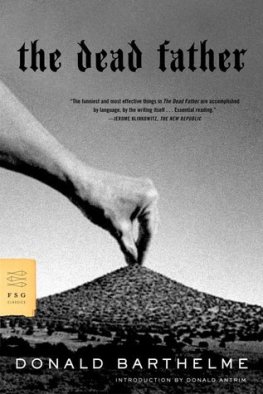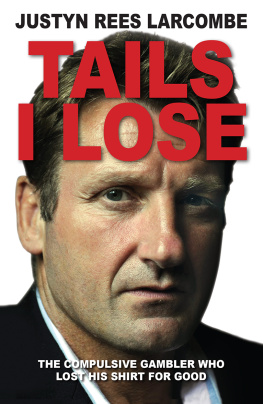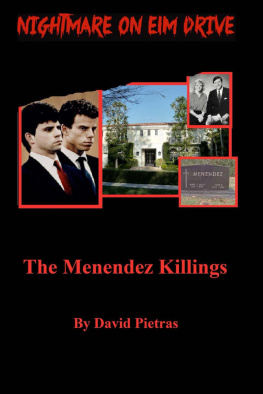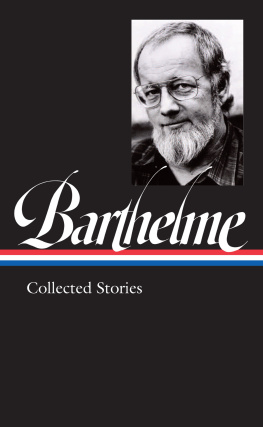Copyright 1999 by Frederick and Steven Barthelme
All rights reserved. No part of this publication may be
reproduced or transmitted in any form or by any means,
electronic or mechanical, including photocopy, recording,
or any information storage and retrieval system, without
permission in writing from the publisher.
Requests for permission to make copies of any part
of the work should be mailed to the following address:
Permissions Department, Harcourt, Inc.,
6277 Sea Harbor Drive, Orlando, Florida 32887-6777.
www.harcourt.com
Published by special arrangement with
Houghton Mifflin Company
Library of Congress Cataloging-in-Publication Data
Barthelme, Frederick, 1943
Double down: reflections on gambling and loss/
Frederick and Steven Barthelme.1st Harvest ed.
p. cm.
First published: Boston: Houghton Mifflin, 1999.
ISBN 0-15-601070-4 ISBN-13: 978-0-15-601070-2
1. Compulsive gamblingMississippi.
2. Compulsive gamblersMississippiPsychology.
I. Barthelme, Steve. II. Title.
RC569.5.G35 B37 2001
616.85'841dc21 00-053921
Designed by Robert Overholtzer
Text set in Palatino
First Harvest edition 2001
K J I H G F E D C B A
Printed in the United States of America
W E ARE BROTHERS , college professors and writers, and for a period starting in 1995 we often played blackjack all night long at the casinos in Gulfport and Biloxi, Mississippi. At first we were playing on paychecks, our tiny savings accounts, credit card advances, and we lost everything we could get our hands on. Then, in 1995 and 1996, our parents died, one after the other in quick succession, and after that we gambled more, and harder. We lost everything they left us, and then some. Still, we went on playing. We'd start at eleven in the evening, play through the whole of the graveyard shift, finish up at ten in the morning, or ten the next night, always bleary-eyed and fatigued, pleased if we'd won, resigned if we'd lost. This went on, became a routine, something we did every couple of weeks, sometimes more often, sometimes less. We'd go off it for a while, maybe months, then back to it, as before. In the end, we were busted out of the Grand Casino at ten in the morning on November 11, 1996, and later, indicted and charged with felony conspiracy to defraud the casino. For two years these widely publicized charges hung over our heads, shadowing our every step, until, in the summer of 1999, the Harrison County district attorney requested dismissal of the case without a trial. On August 4,Judge Robert Walker, acting on the D.A.'s request, dismissed all charges.
I
1. Mississippi
W E ARRIVED in Hattiesburg almost ten years apart. We'd held plenty of other jobscab driver, construction worker, advertising writer, journalist, art installer, architectural draftsmanand we'd each done stints at The Johns Hopkins University in Baltimore for graduate degrees, and now we were ready to settle down and teach.
Rick arrived first, in the mid-seventies, terrified because Mississippi had that reputation, that myth the prominent aspect of which wasn't the lovely Old South with its high manners and splendid architecture, but ignorance, burning, lynching. Being from Houston, having lived five years in New York City, and just out of graduate school, he figured he was profoundly enlightened and Mississippi wasn't. Indeed, his introduction to Hattiesburg was at an all-night gas station on Highway 49 where a lone teenager-slash-halfwit was capturing "pinching" bugs attracted by the bright lights and corralling them in a five-gallon bucket of sand he kept inside his little glass booth, a diversion he favored because, as he said, he liked to watch the bugs kill each other.
This was two in the morning, and Rick and his girlfriend had been driving all day from Baltimore, where the morning before they'd had brunch with the British literary critic Tony Tanner in the polished-mahogany restaurant on the first floor of a hundred-year-old hotel. Now instead of talking about postmodernism they were facing it, and it didn't seem to know their names.
So Rick spent the first six weeks of his employment at the University of Southern Mississippi commuting from Houston, a safe four hundred and fifty miles away. In time he discovered that Mississippi was as civilized as anywhere else. The gas jockey notwithstanding, things had apparently changed, and at least in Hattiesburg and around the university, the myth was a phony. In fact, taken as a whole, the people he met in Mississippi began to seem gentler and more humane than many he'd run into in ostensibly finer settings. Probably there were remnants of the "old" Mississippi elsewhere in the New South of the seventies, but those remnants weren't on public view, did not seem dominant. In spite of the benighted reputation, Mississippi seemed more than its share enlightened.
Steve arrived nine years later, and if some of his impressions were different, maybe that was because when he arrived in Hattiesburg he had already spent the previous two years teaching at a university in Monroe, a dim, depressed, trash-strewn Louisiana town where even the snakes hung their heads. If the races seemed to him stiffer with each other in Mississippi than they had been in Louisiana, Hattiesburg itself was clean and bright, and the people were friendly. There was more money apparent, and the roads were mostly paved. During his first weeks in town he noticed two, maybe three Volkswagen beetles. You wouldn't have found them in Monroe.
So there we were, college professors and fiction writers. We were middle-aged, born in Texas, raised in a family of mostly fallen Catholics, with a father who was a successful and innovative architect and teacher, and a mother who was an English teacher and a reader, an actress in college who had wanted to pursue the stage but didn't quite escape the conventionality of her time. One older brother, Don, was a leading literary figure. Two other older siblings made their livings writing: Joan as a public relations vice president for Pennzoil Corporation, Pete as a Houston advertising executive and an author of mystery novels.
Growing up, we were trained in restlessness and doubt. Conformity wasn't prized. The house our father designed in 1939a large, low, flat-roofed box with a single small square room standing up on topwas an anomaly in a neighborhood of ranch-style and Tudoresque homes. Our house looked like a large, rectilinear Merrimac. On the empty grasslands west of Houston, it startled passersby.
The house had been made of wood alone, but later the exterior was covered in copper. Our father had this idea about copper. He had read that when sprayed with a certain acid compound, copper would discolor in a particularly attractive way, so he hired a contractor and several workmen and had the vertical siding covered in sheet copper. Then he bought a sprayer, a two-foot tank with a manual pump, and he mixed up a batch of the acid that was going to make the copper come alive in an exquisite turquoise. Well, it didn't happen. The copper asserted itself, and from that time forward the house wasexquisitelybrown.
Inside, it was a hotbed of modern furniture: elegant Saarinen chairs, the bent birch of Aalto dining tables and chairs, almost every piece of furniture or fabric that Charles and Ray Eames ever designed, from the little wire-frame footstools all the way up to, much later, the big rosewood and black leather chair, now ubiquitous. The rest of the furniture Father built himself, or had us build under his supervision. Things were always being redone, reconstructed, redesigned in accordance with some new idea he had.
We went to Catholic schools, and there, along with the conventional subjects, we were schooled in guilt. This was before traditional Catholicism lost its purchase, before "mea culpa" became "my bad," or however it's now translated.
Next page









